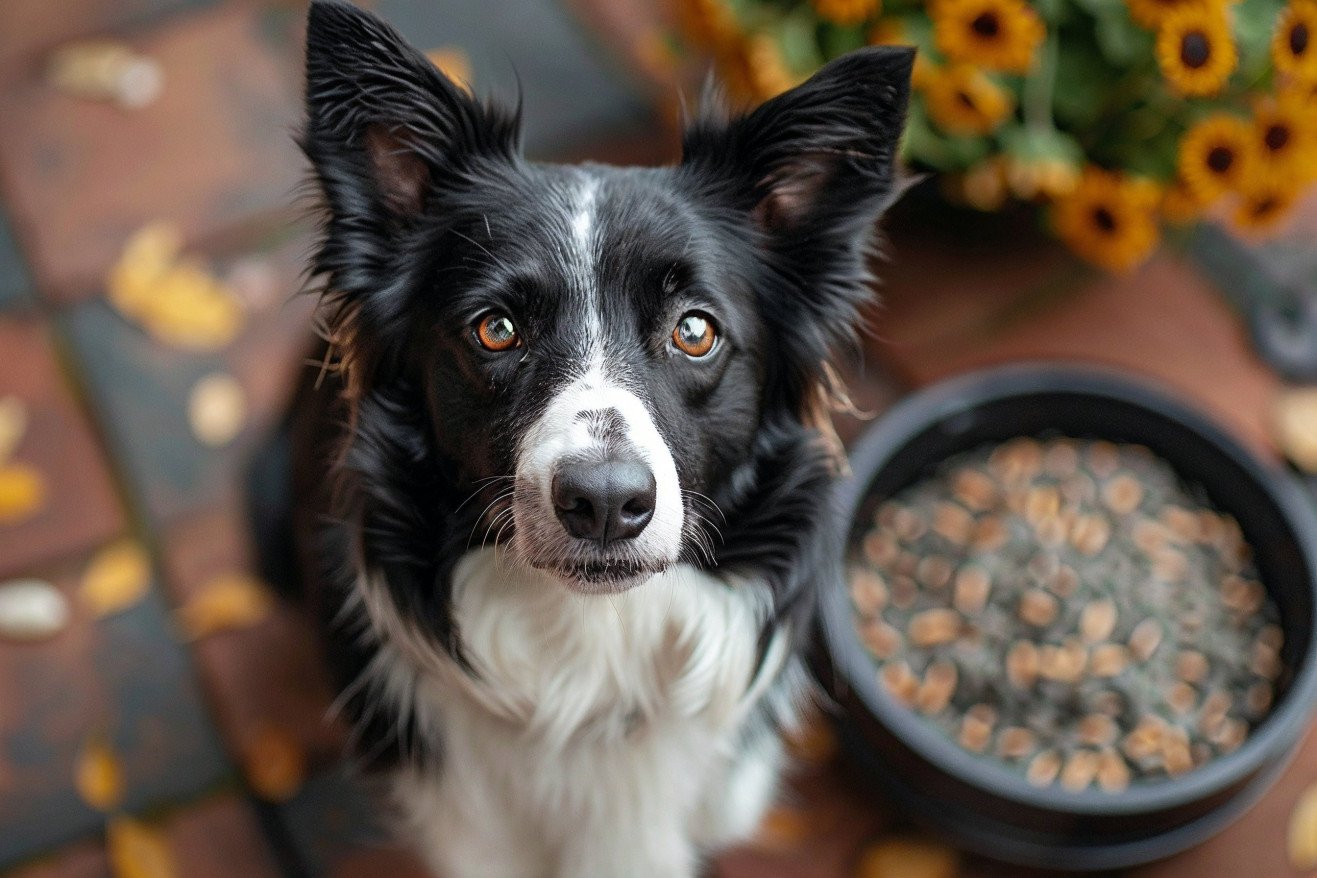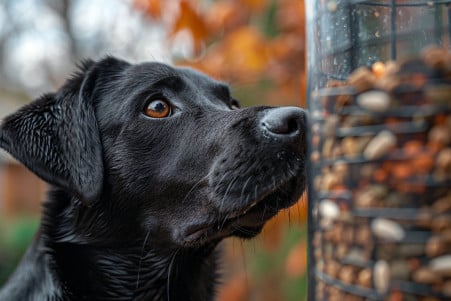Can Dogs Eat Sunflower Seeds? The Ultimate Evidence-Based Answer
13 April 2024 • Updated 13 April 2024

If you're a dog owner who's ever asked, "Can dogs have sunflower seeds?" you're not alone. Many pet parents want to know whether sunflower seeds are a good choice for their dogs. As with any food, the answer depends on a variety of factors, including the potential benefits and risks of feeding sunflower seeds to dogs. In general, sunflower seeds can be a healthy, occasional treat for most dogs, but there are some compounds in sunflower seeds that can lead to digestive problems and other concerns if dogs eat too many.
So, while there's plenty of anecdotal evidence on both sides of this issue, let's take a look at the science to get a complete picture of whether sunflower seeds are bad for dogs. We'll review veterinary research on the impact of the individual nutrients in sunflower seeds on dogs. We'll also look at broader nutritional research to determine where sunflower seeds fit in a healthy, balanced dog diet and how much is too much. By the end, you'll know whether you can safely give sunflower seeds to your dog as an occasional treat.
Are sunflower seeds bad for dogs?
Hazards of Sunflower Seed Shells for Dogs
Sunflower seeds can be a healthy addition to your dog's diet, but the shells that encase them can be dangerous. Origin Labs explains that sunflower seed shells are not easily digestible and can lead to intestinal blockages if swallowed whole. Dogs that are smaller or that eat too quickly are at a higher risk of choking on sunflower seed shells.
Even if your dog doesn't choke on the shells, they can still cause vomiting, diarrhea, and abdominal pain as the body tries to pass the fibrous material. One dog owner shared that their large dog showed signs of nausea and discomfort after eating sunflower seed shells, but because the amount was small, the shells were unlikely to cause a blockage.
To prevent these issues, make sure to remove the shells from sunflower seeds before giving them to your dog as a treat. If your dog does eat the shells, watch for signs of vomiting, diarrhea, loss of appetite, or signs of abdominal pain. If you notice any of these symptoms, contact your vet right away. They may be able to suggest ways to help the dog pass the shells or check for blockages. By taking these precautions, you can make sure your dog can safely enjoy the benefits of sunflower seeds.
Nutritional Benefits of Sunflower Seeds for Dogs
Sunflower seeds can offer a number of important nutrients to dogs, including healthy fats, protein, fiber, vitamins, and minerals. The American Kennel Club explains that the fatty acids in sunflower seeds can help dogs maintain healthy skin and a shiny coat. The Canine Nutritionist also explains that sunflower seeds are "a rich source of B vitamins and vitamin E together with magnesium, manganese, phosphorus, iron and zinc" that can help provide antioxidants that can help the immune system and reduce inflammation.
Studies published on the National Institutes of Health have found that fatty acids like those in sunflower seeds can have positive effects when used as a dietary supplement in dogs. The vitamins and minerals in sunflower seeds can also help with a dog's general health, including supporting heart health and aiding in brain health.
That said, it's important to remember that sunflower seeds should be used as a supplement and not a replacement for a well-balanced dog food diet. As TryFi points out, overconsumption can lead to weight gain and digestive issues because of their high fat content.
Portion Control and Moderation
Sunflower seeds should be given to dogs in moderation and as an occasional treat, not as a regular part of their diet. Wooffy notes that the amount of sunflower seeds you can give your dog depends on their size, with small dogs receiving 10-20 seeds a week and large dogs receiving 20-40 seeds a week. Overconsumption of sunflower seeds can result in weight gain, digestive upset, and other health issues due to their high fat and calorie content.
Dogster recommends that you start by giving your dog a small amount of sunflower seeds and watch for any adverse reactions, as some dogs may be allergic or intolerant. It's best to consult with a vet to determine the right portion size for your dog based on their individual needs and health concerns. If you do this, you can give sunflower seeds to your dog as an occasional treat without worrying about their health.
That said, not all sunflower seeds are safe for dogs, as we'll discuss in the next section.
Sunflower Seeds to Avoid
Not all sunflower seeds are safe for dogs. Per Sidekick by Finn, dogs should not eat sunflower seeds that are salted, roasted, or flavored, as these can contain high levels of sodium, oils, and other additives that are toxic to dogs. Sunflower seeds are often included in trail mixes or snack mixes that can also contain other ingredients like chocolate, raisins, or xylitol that are harmful to dogs.
PetMD warns that dogs should only be given plain, shelled, unsalted sunflower seeds to avoid potential health issues. Likewise, Puppy Puzzle Feeder notes that most sunflower seeds sold in stores are heavily salted or seasoned, which can cause sodium ion poisoning in dogs.
If you're not sure which sunflower seed products are safe, make sure to read the ingredients list carefully or ask your vet before giving your dog any sunflower seed products. Make sure to use moderation and proper preparation to ensure that this healthy treat is safe for your dog to eat.
Symptoms of Sunflower Seed Overdose and Toxicity
Although sunflower seeds can be a good snack for dogs, eating too many can cause a number of health problems. According to the dog owner's report, symptoms of sunflower seed toxicity or overdose can include vomiting, diarrhea, abdominal pain, lethargy, and loss of appetite.
The seeds' high fiber content can also cause gastrointestinal issues and discomfort if consumed in large quantities. As mentioned by MyPetSensitivity, the seeds' high calorie count can also cause weight gain and related issues if dogs eat too many.
If a dog shows any symptoms of distress after eating sunflower seeds, it's important to get them to the vet right away. Make sure to watch for any negative reactions and talk to a vet to make sure your dog stays safe and healthy.
Conclusion: Feed Sunflower Seeds in Moderation
Sunflower seeds can be a healthy and fun occasional snack for many dogs, but it's important to feed them safely and in moderation. MasterClass explains that sunflower seeds are packed with antioxidants, healthy fats, and other important nutrients. The American Kennel Club even says that the fatty acids in sunflower seeds can help dogs maintain healthy skin and a glossy coat.
Still, Great Pet Care warns that sunflower seeds should be fed in small amounts as an occasional snack, with a recommended serving of 10-20 seeds for small dogs and 30-40 seeds for larger dogs, a few times a week at most. They also caution that sunflower seeds should be used as a supplement to a dog's regular diet, not a replacement.
In addition, it's important to always remove the shells and avoid salted, roasted, or flavored varieties, since, as DogTime points out, these can be harmful to dogs because of their high sodium content. Finally, portion sizes should be adjusted based on a dog's size and individual health considerations, and sunflower seeds should be introduced slowly while keeping an eye out for any negative side effects.
In general, it's a good idea to talk to a vet, especially if your dog has any health issues, to make sure that sunflower seeds are a safe and healthy snack for your furry friend.


